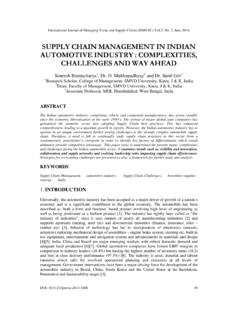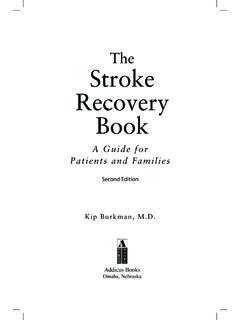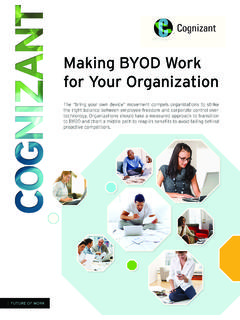Transcription of MENTAL ILLNESS AND JUSTICE ISSUES - miministry.org
1 1 MENTAL ILLNESS AND JUSTICE ISSUES As individuals and as a nation, therefore, we are called to make a fundamental "option for the poor". The obligation to evaluate social and economic activity from the viewpoint of the poor and the powerless arises from the radical command to love one's neighbor as one's self. Those who are marginalized and whose rights are denied have privileged claims if society is to provide JUSTICE for all. This obligation is deeply rooted in Christian belief. THE CHURCH IN THE MODERN WORLD, #69, SECOND VATICAN COUNCIL Deacon Tom Lambert Catholic Archdiocese of Chicago Commission on MENTAL ILLNESS 2 Scope of the issue MENTAL illnesses include such disorders as schizophrenia, schizoaffective disorder, bipolar disorder, major depressive disorder, obsessive-compulsive disorder, panic and other severe anxiety disorders, borderline personality disorder, and other severe and persistent MENTAL illnesses that affect the brain.
2 O These [ MENTAL illnesses] can profoundly disrupt a person's thinking, feeling, moods, ability to relate to others and capacity for coping with the demands of life. MENTAL illnesses can affect persons of any age, race, religion, or income. MENTAL illnesses are not the result of personal weakness, lack of character, or poor upbringing. MENTAL illnesses are treatable. Most people with serious MENTAL ILLNESS need medication to help control symptoms, but also rely on supportive counseling, self-help groups, assistance with housing, vocational rehabilitation, income assistance and other community services in order to achieve their highest level of recovery. 1 MENTAL illnesses are common in the United States and internationally. o An estimated percent of Americans ages 18 and older about one in four adults suffer from a diagnosable MENTAL disorder in a given year. 2 One in 17 suffers with severe MENTAL ILLNESS . o MENTAL [illneses] are the leading cause of disability (lost years of productive life) in the North America, Europe and, increasingly, in the world.
3 By 2020, Major Depressive ILLNESS will be the leading cause of disability in the world for women and o MENTAL [illnesses] account for 4 of the 10 leading causes of disability in the United o In 2002, 31,655 (approximately 11 per 100,000) people died by suicide in the , 90% have a diagnosable MENTAL [ ILLNESS ]. 5 o Each year, almost 5,000 young people between the ages 15 to 24 take their own lives. The rate of suicide for this age group has nearly tripled since 1960, making it the third leading cause of death in adolescents and the second leading cause of death among college-age youth. 6 o At least six million American children have difficulties that are diagnosed as serious MENTAL [ ILLNESS ], according to government surveys a number that has tripled since the early 1990 s. 7 3 THE DIGNITY OF THE INDIVIDUAL. Catholic social teaching calls us to recognize that each person has dignity and all life is sacred.
4 In Pope Benedict XVI s message for the 2006 World Day of the Sick he specifically addresses the issue of MENTAL ILLNESS . He states Every Christian, according to [their] specific duty and responsibility, is called to make [their] contribution so that the dignity of these brothers and sisters may be recognized, respected and promoted. 8 Pope John Paul II s 1997 message to healthcare workers states that Whoever suffers from MENTAL ILLNESS 'always' bears God's image and likeness in [themselves], as does every human being. In addition, [people with MENTAL ILLNESS ] 'always' have the inalienable right not only to be considered as an image of God and therefore as a person, but also to be treated as such. 9 One of the greatest obstacles for people with MENTAL ILLNESS and for their families is overcoming the stigma the general public associates with MENTAL ILLNESS . Stigma erodes the dignity of the person and hinders us from seeing a person as an image of God.
5 Stigma detracts from a person s dignity and keeps people from receiving the treatment and care they need for recovery. o The Surgeon General's recent report on MENTAL health argues that the stigma around MENTAL ILLNESS is one of the most significant challenges to the development of effective MENTAL health policy10 o This stigma has intensified over recent decades, despite the advancement of scientific knowledge about the causes of MENTAL ILLNESS and the effectiveness of certain treatments; studies show that a greater portion of people associated MENTAL ILLNESS with violence in the 1990s than the general public did in the o Nearly two-thirds of all people with diagnosable MENTAL [ ILLNESS ] do not seek treatment12 o Stigma pushes people to the margins of our society. People fear what they do not know and the stigma of MENTAL ILLNESS exacerbates the misconceptions people have about who the person really is. As Church we are called to counter the sinful effects of stigma by: o Using people first language to reinforce the dignity of the person, , people with a MENTAL ILLNESS not the mentally ill.
6 This allows people with MENTAL ILLNESS to be recognized as a person not a disease. o Recognizing that everyone has something to contribute. We value the individual for who they are and what gifts he or she brings to the community. 4o Debunking myths and MENTAL ILLNESS characterizations that portray people by generalizations that have no basis in fact and are negative and demeaning. o Welcoming and including all people into our faith community and treating each person with dignity and respect. Finding ways to proactively include people. o Educating and informing faith communities about the facts concerning MENTAL ILLNESS PREFERENTIAL OPTION FOR THE POOR Another theme of Catholic Social teaching is our priority for those who are most vulnerable and pushed to the edges by society. A basic moral test for our or any society is how the most vulnerable members are treated. Our society is flawed by a widening gap in health care and services between the rich and the poor.
7 We look to the story of the Last Judgment which instructs us to put the needs of the poor and vulnerable first - ..Lord, when did we see you hungry and feed you, or thirsty and give you drink? When did we see you a stranger and welcome you, or naked and clothe you? When did we see you ill or in prison, and visit you? And the king will say to them in reply, Amen, I say to you, whatever you did for one of these least brothers of mine, you did for me. (Mt 25:37-40 Prisons and Jails have become the largest deliverers of MENTAL health services in the United States o Largest MENTAL health provider in the country is Los Angeles County jail o At midyear 2005 more than half of all prison and jail inmates had a MENTAL health problem, including 705,600 inmates in State prisons, 70,200 in Federal prisons, and 479,900 in local jails. These estimates represented 56% of State prisoners, 45% of Federal prisoners, and 64% of jail o Very few prisoners in general prison and jail populations receive the treatment they need Only ---- Over 1 in 3 State prisoners and 1 in 6 jail inmates who had a MENTAL health problem had received treatment since Death penalty o The majority of countries except the prohibits the death penalty for people with MENTAL ILLNESS o Although precise statistics are not available, it is estimated that 5-10 percent of people on death row have a serious MENTAL ILLNESS .)
8 5 o In 1986, the Supreme Court ruled that people with MENTAL ILLNESS can be executed if they understand the punishment that awaits them and why they are being put to death. This ruling has prompted some states to provide psychiatric treatment to offenders with MENTAL ILLNESS on death row in order to restore their competency. Also some states are medicating defendants involuntarily in order to make them competent either to stand trial or to be executed. Homelessness o Deinstitutionalization of public MENTAL hospitals created an increase in homelessness because of poorly funded community programs. o Lack of an array of services and affordable housing in the community adds to the MENTAL health crisis. o At least 20 to 25% of homeless people have a MENTAL MENTAL ILLNESS among people who are homeless is generally acknowledged as much higher. As church o We are called to change the systemic problems that result in prisons and jails being the largest MENTAL healthcare provider in the country.
9 In addition to individual acts of compassion and caring for people with MENTAL ILLNESS we are called to work for better laws and polices that end discrimination and marginalization of people with MENTAL illnesses, cause homelessness, and add to the high recidivism rate for people who are in prisons and jails. FUNDAMENTAL RIGHT TO LIFE AND A RIGHT TO THOSE THINGS REQUIRED FOR HUMAN DECENCY. Another major theme of Catholic social teaching is that human dignity can be protected and a healthy community can be achieved only if human rights are protected and responsibilities are met. Every person has a fundamental right to those things required for human decency including healthcare. It is our responsibility to protect these rights. The MENTAL healthcare system in the United States is often described as dysfunctional and uneven in its care for people with MENTAL ILLNESS . MENTAL ILLNESS is a treatable brain disease with better success rates than many other diseases.
10 Studies have shown that proper diagnosis, medication, and an appropriate range of community psycho-social rehab support services will deliver cost effective results that are actually less expensive than the current disconnected delivery system now in place. Yet the needs of many go unmet which is unconscionable. Poor Health Care systems foster continuous cycles of crisis for people with MENTAL ILLNESS and their families. 6 o Over 40 million people in the United States have no healthcare insurance o While effective treatments exist for most common MENTAL [illnesses], studies have shown that many consumers seen in primary care settings do not receive them. Even in the1990s, most adults with depression, anxiety, and other common MENTAL [illnesses] did not receive appropriate care in primary care settings. Older adults, children and adolescents, individuals from ethnic minority groups, and uninsured or low-income patients seen in the public sector are particularly unlikely to receive care for MENTAL [illnesses].





